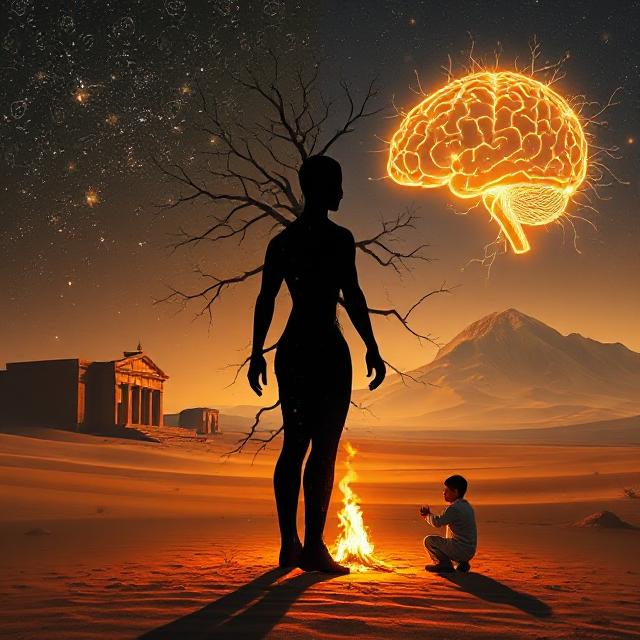Your cart is currently empty!
Are Humans Naturally Religious?

Table of Contents
Are Humans Naturally Religious?
Are humans naturally religious, or is religion a learned cultural phenomenon? This age-old question sits at the intersection of evolutionary psychology, anthropology, cognitive science, and theology. From prehistoric burial sites to modern cathedrals, humanity’s record is filled with rituals, symbols, and stories that reach beyond the physical world. But what does this say about our nature?
In this article, we’ll explore evidence from science and history to determine whether religiosity arises from innate human tendencies or is merely a cultural artifact passed down across generations.
I. The Ubiquity of Religion Across Cultures
One of the strongest arguments for humans being naturally religious is the universal presence of religion across cultures and time periods. Whether it’s animism in hunter-gatherer societies or organized theologies like Hinduism, Christianity, and Islam, religious expression is nearly ubiquitous.
A. Shared Themes
Common elements recur in vastly different religious systems: a belief in higher powers, rituals, moral codes, sacred spaces, and explanations for death. This consistency suggests a shared psychological framework.
B. Ancient Evidence
Archaeological findings show burial rites dating back over 100,000 years, with offerings of tools and pigments like ochre—hints at early spiritual concepts like an afterlife.
II. Evolutionary Psychology and Religion
According to evolutionary psychology, religion may be a byproduct of traits that were naturally selected for survival.
A. Pattern Recognition and Agency Detection
Humans evolved to detect patterns and infer agency—useful for identifying predators or other humans. This hyperactive agency detection may also lead us to perceive gods, spirits, or fate in nature.
B. Theory of Mind
The ability to attribute thoughts and intentions to others, called Theory of Mind, allows us to model what others are thinking—including invisible agents like deities or ancestors.
C. Social Cohesion and Morality
Religion often enforces group morality, aiding in group survival. Shared beliefs and rituals bond members, creating trust and cooperation.
III. Cognitive Science of Religion (CSR)
The field of Cognitive Science of Religion argues that our minds are predisposed to religious thinking.
A. Minimally Counterintuitive Concepts
Religious ideas are often just counterintuitive enough to be memorable (e.g., a talking bush or omnipresent being), which helps them spread.
B. Mental Modules
Cognitive scientists propose that religion emerges from existing brain modules—like memory, social reasoning, and emotion—not from a specific “God spot.”
C. Children and Religion
Children naturally anthropomorphize objects, accept supernatural explanations, and show intuitive dualism (mind-body separation). This makes them receptive to religious ideas from an early age, even before formal instruction.
IV. Neuroscience of Religious Experience
While there’s no single “religion center” in the brain, neuroscience has uncovered patterns.
A. Temporal Lobe and Mysticism
Stimulation of the temporal lobes can lead to out-of-body or mystical experiences. Some epileptics report spiritual visions, possibly explaining some prophets’ experiences.
B. Default Mode Network (DMN)
The DMN is associated with self-reflection and the sense of self. Meditation and prayer often reduce DMN activity, creating feelings of unity or transcendence.
C. Neurochemical Correlates
Practices like chanting, fasting, or pilgrimage trigger dopamine and endorphin releases, reinforcing spiritual behavior through reward circuitry.
V. Cultural Transmission vs Biological Inheritance
Some scholars argue that while the mind is predisposed to religious ideas, religion itself is cultural.
A. Memes and Social Learning
Religion spreads like language—through imitation, storytelling, and reinforcement. It evolves in societies via memetic competition, not genetic selection.
B. Secular Societies
The rise of secularism in some countries (e.g., Scandinavia, Japan) shows that religion isn’t biologically inevitable. It can fade when societal needs are met by other systems.
C. Religion as Meaning-Making
Humans may not be religious per se—but they seek meaning. Religion is one culturally effective tool for fulfilling existential needs, but not the only one.
VI. Arguments from Theologians and Philosophers
Theists often argue that the natural tendency toward religion is itself evidence of the divine.
A. C.S. Lewis’s Argument from Desire
Lewis suggested that just as hunger points to food and thirst to water, the human longing for the divine points to its reality.
B. Augustine’s Restless Heart
St. Augustine wrote, “Our heart is restless until it rests in Thee.” The universality of this longing, he argued, implies a divine source.
C. Critics Respond
Skeptics argue that just because we desire or intuit the divine doesn’t mean it exists—desire doesn’t prove reality.
VII. Conclusion: Nature, Nurture, or Both?
So, are humans naturally religious? The answer lies somewhere between biology and culture. Our brains are predisposed to belief: we seek agency, meaning, and connection. Religious systems offer powerful tools to meet these needs—but the forms they take are shaped by culture.
Whether you’re a theist, atheist, or agnostic, understanding the natural roots of religion helps us appreciate why belief plays such a powerful role in the human story.
